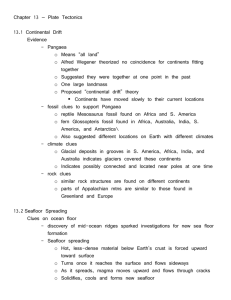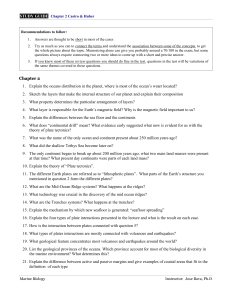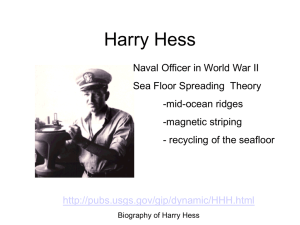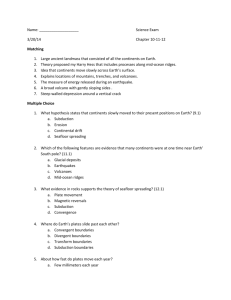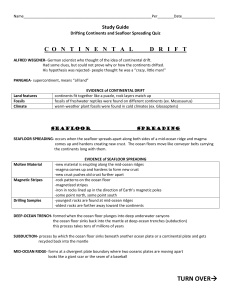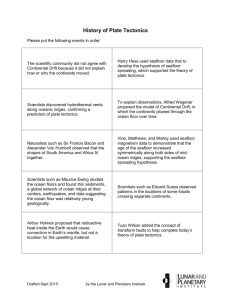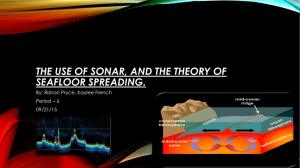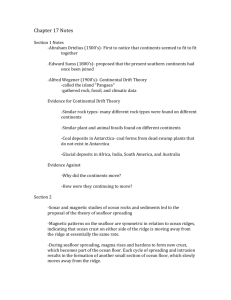The Theory of Seafloor Spreading
advertisement
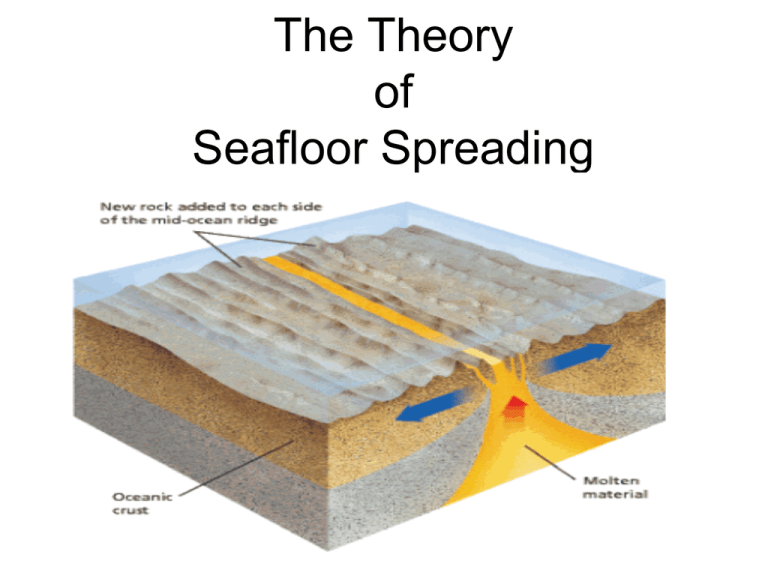
The Theory of Seafloor Spreading Seafloor Bathymetry Creating Maps of the Ocean Floor • Scientists were able to map the ocean floor using sonar, an Echosounding devices. • The time it takes for sound waves to travel through the ocean and back is recorded to calculate ocean depth which is then converted to an image of the ocean floor. Map of Ocean Floor Mid-Ocean Ridges and Trenches form the Boundaries of Earth’s Tectonic Plates HARRY H. HESS • Scientist (geologist) who proposed the Theory of Seafloor Spreading in early the 1960 ‘s. How Does Seafloor Spreading rises through the Work? 1. Magma center of mid-ocean 2. 3. 4. Subduction of older, more dense ocean crust into the mantle where it is recycled. ridges. It cools and forms new rock on either side of the ridge. As more seafloor is created, the older floor is pushed away from the ridge and spreads the seafloor. The oldest ocean floor becomes more dense because of the accumulation of sediment and forms trenches where the seafloor is recycled into the Asthenosphere in a process called subduction. The Theory Says: • The seafloor spreads apart along both sides of a midocean ridge as new crust is being added. • As a result the ocean floor moves like conveyor belts, carrying the continents with them. The Ocean Floor is NOT Flat; it contains a system of mountains, valleys and trenches that extend through the center of much of Earth’s oceans. Mid-Ocean Ridges – Underwater volcanic mountain range that is more than 56000 kilometers (35000 mi) long, where new seafloor is being created. Rift Valley – The valley between the ridges where lava rises on the ocean floor and forms new rock. Trench – Deep, steep, narrow crack in the ocean floor where old sinks back into the mantle and is recycled. Evidence to support Sea floor Spreading 1. Evidence from Molten Material Alvin Submarine • Hardened rocks shaped like pillows were discovered along the ridge. • These rocks only form when lava cools quickly underwater. • Pillow Lava (rocks) prove that new rock is being formed at ridges because it only forms under water. http://www.pmel.noaa.gov/v ents/nemo/explorer/concepts The Discovery of Magnetic Stripes (of Rock) • Using a Magnetometer hanging from a boat, two English scientists, Drummond Matthews and Fred Vine discovered magnetic bands on either side of the Mid-Atlantic Ridge. 2. Evidence from Magnetic Striping As new Basaltic seafloor is created at the ridges, the iron particles in it magnetize differently proving that new seafloor was created at different times in our history. Normal Polarity = N Reverse Polarity = S The iron lines up in the direction of the Earth’s strongest magnetic pole of the time and is locked into place when the rocks form proving that new rocks are always forming at the ridges. Magnetic Zebra Stripes 3. Age Evidence from Drilling Samples • The oldest ocean rock is only 180 million years old compared to the continents which are over 4 billion years old. • Young rocks are found close to the ridge • Old rocks are found further away from the ridges. Glomar Challenger research ship used to drill in the seafloor. • Deep Sea Drilling Ship If New Seafloor is Always Created, Then Why Isn’t the Earth Blowing up Like A Balloon? Old seafloor is being consumed or recycled at the trenches! • Places where seafloor is pushed back into the Asthenosphere are called SUBDUCTION ZONES. • Subduction occurs at the trenches. So What is the Significance of The Theory of Seafloor Spreading? The Theory of Seafloor Spreading Answers the Question: HOW the Continents Moved! As the seafloor spreads at midocean ridges, the ocean floor moves carrying the continents with it!
